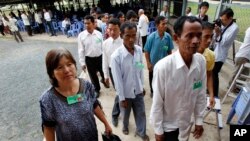As a guilty verdict and life sentence were announced for two aging Khmer Rouge leaders Thursday, reaction to the news varied, depending on where the news came.
For many Cambodians, those who were watching proceedings from the UN-backed tribunal at home, or in coffee shops, the long-awaited verdict was justified and was another step toward final resolution of court proceedings that began in 2006. For former Khmer Rouge fighters and cadre, Thursday’s announcement elicited more complex reactions.
The two leaders, Noun Chea and Khieu Samphan, were given life sentences for crimes against humanity from the mass exodus of Phnom Penh in April 1975, when the regime toppled the government and came to power, beginning a nearly four-year reign that cost more than 1.7 million people—a quarter of the population—their lives.
In the capital Thursday, the verdict was met mostly with approval.
Lim Vutha, a 46-year-old resident, watched with his family in Phnom Penh’s Teuk Thla commune. “Look at what they have done during the regime,” he said, after the verdict was read. “They really deserve it.”
In a coffee shop near the bustling Orussey Market, where the verdict was broadcast live, Thy Sova Vath, a 52-year-old who lost nine family members to the regime, said he wasn’t surprised by the verdict. “They had their hands soaked with the blood of a million Khmer,” he said.
Sun Sokha, 50, a resident of Boeung Keng Kang commune, said life sentences were enough for the crimes. “We don’t have the death penalty,” she said.
A 70-year-old tuk-tuk driver named Kav Yel agreed. “It shows justice to me,” he said. “They were also under orders from their top leaders. Maybe killing people wasn’t what they wanted.”
In the countryside, especially in former Khmer Rouge areas, the verdict was met with mixed reactions. Former Khmer Rouge soldier Sam Oun, a resident in Malai district, Banteay Meanchey province, said the two leaders had not meant to have so many people killed. It was the lower-level officers who manipulated policy, she said.
“It is sad,” she said. “The leaders just made policy, but the implementers at lower levels just over-implemented the policy. So the leaders are the victims.” She said she hoped the two aging leaders would be well cared for in prison.
Sam Oun and others watched the verdict broadcast via a live screening put on by the Documentation Center of Cambodia, which researches Khmer Rouge atrocities. Twenty screenings were held across the country.
Not everyone in the countryside was so sympathetic, even in former Khmer Rouge areas.
Em Pok, chief of Malai’s Cham Bak commune, said he agreed with the verdict. “What they did was so oppressive to the people,” he said.
Pho Lun, 57, a resident in Anlong Veng district, Oddar Meanchey province, also agreed. “I think this is righteous because our country has law, rule of law and a judicial system.”
Chy Terith, head of the victim support project at the Documentation Center, said among 200 screening participants, mostly Khmer Rouge troops, most agreed with the verdict, while many suggested the court end its work after the trials of Nuon Chea and Khieu Samphan.
“Former Khmer Rouge troops think uniquely,” Chy Terith said. “They are afraid of being charged by the court.”
What resolution this case, and this verdict, will bring to a country that has long-suffered under the shadow of the Khmer Rouge remains to be seen. For some, the verdict did not mean much at all.
“It’s normal to enforce the law,” said Sok Pheap, a former Khmer Rouge commander who led a defection to the government in 1996 and is now at the Ministry of Defense. “Actually, the persons who gave the orders are all dead, like Pol Pot and others.”
Yim Phana, the governor of Anglong Veng, one of the last bastions of the regime, said the verdict was the result of law, governance and a court system. But the two leaders were not unusually cruel, he said. “I feel pity for them.”




